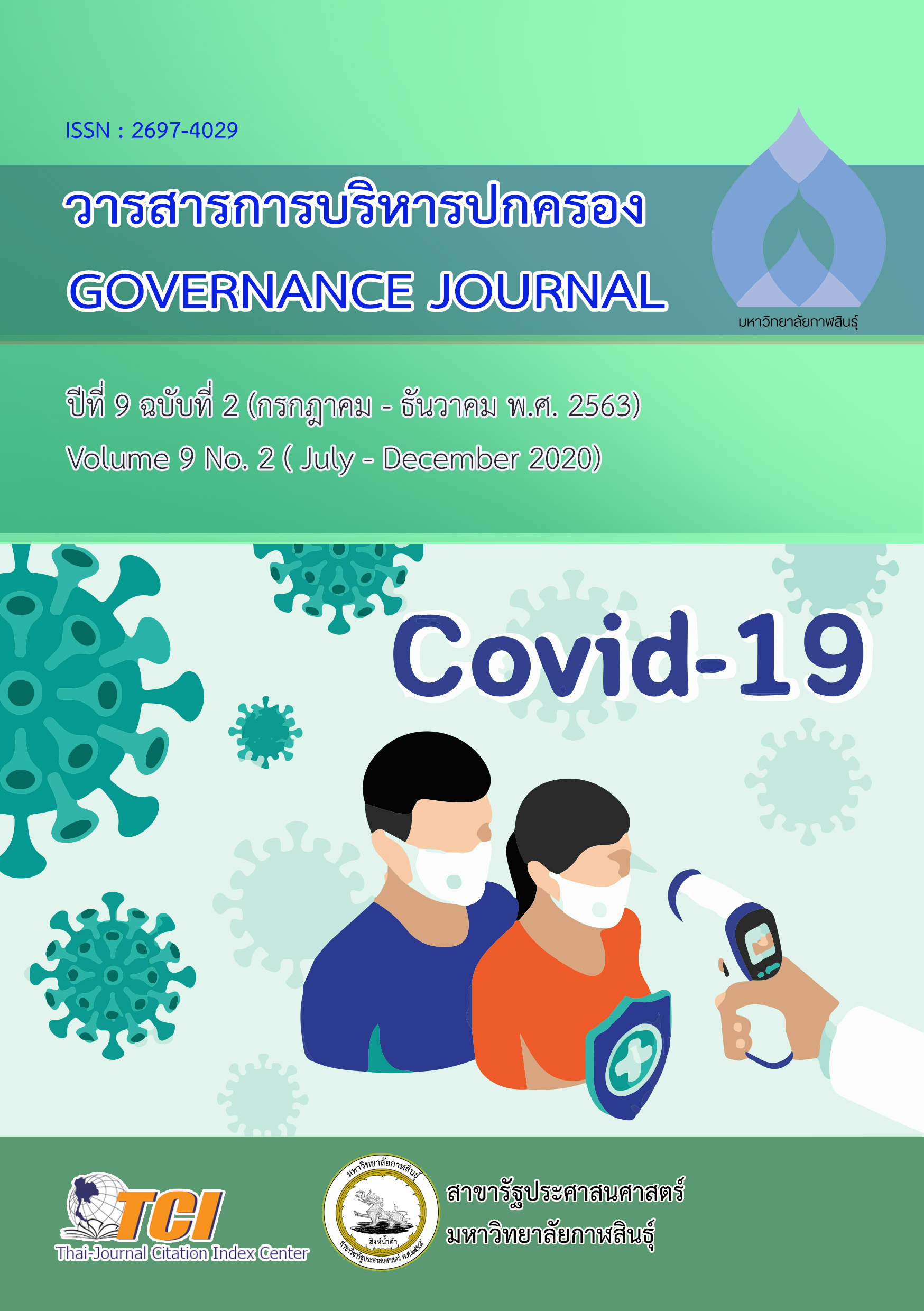แนวทางการพัฒนานวัตกรรมการจัดการปัญหาขยะอิเล็กทรอนิกส์ในชุมชน ตำบลหนองตอกแป้น อำเภอยางตลาด จังหวัดกาฬสินธุ์
DOI:
https://doi.org/10.14456/gjl.2020.37คำสำคัญ:
การจัดการขยะอิเล็กทรอนิกส์, ขยะอิเล็กทรอนิกส์, ภาวะผู้นำบทคัดย่อ
งานวิจัยนี้มีวัตถุประสงค์ในการศึกษาเพื่อศึกษาการจัดการขยะอิเล็กทรอนิกส์ในชุมชนกับความสัมพันธ์กับความเป็นผู้นำและการจัดการนวัตกรรมชุมชน และเพื่อเสนอแนะแนวทางการจัดการขยะอิเล็กทรอนิกส์เพื่อป้องกันไม่ให้เกิดผลกระทบต่อคุณภาพชีวิตและสิ่งแวดล้อมของชุมชน โดยงานวิจัยนี้ประยุกต์ใช้วิธีวิจัยเชิงปริมาณ ใช้แบบสอบถาม เป็นเครื่องมือในการรวบรวมข้อมูล โดยมีกลุ่มตัวอย่างจำนวน 91 คน ซึ่งเป็นผู้มีส่วนได้ส่วนเสียกับประเด็นที่กำลังศึกษา สถิติที่ใช้ในการวิเคราะห์ข้อมูล ประกอบด้วย สถิติเชิงพรรณนา และค่าสัมประสิทธิ์สหสัมพันธ์แบบถดถอยพหุสัมพันธ์ ผลการวิจัยจากการวิเคราะห์ทางสถิติ พบว่า ภาวะผู้นำแห่งการเปลี่ยนแปลง นวัตกรรมกระบวนการ และนวัตกรรมผลิตภัณฑ์ มีความสัมพันธ์เชิงบวกต่อระดับความพึงพอใจในการจัดการปัญหาขยะอิเล็กทรอนิกส์ ข้อเสนอแนะเชิงปฏิบัติเพื่อการพัฒนาแนวทางการจัดการขยะอิเล็กทรอนิกส์ คือ 1. ควรพิจารณาให้ความสำคัญในการอบรมรูปแบบภาวะผู้นำแห่งการเปลี่ยนแปลงแก่ผู้นำชุมชนเพื่อพัฒนาศักยภาพในการแก้ปัญหาขยะอิเล็กทรอนิกส์ 2. การประยุกต์นวัตกรรมด้านผลิตภัณฑ์ช่วยเพิ่มศักยภาพในการแก้ปัญหาขยะอิเล็กทรอนิกส์ 3. การประยุกต์ใช้นวัตกรรมกระบวนการช่วยให้การจัดการปัญหาขยะอิเล็กทรอนิกส์ดีขึ้น และข้อเสนอแนะเชิงวิชาการ คือ งานวิจัยในอนาคตอาจจะนำแนวทางการศึกษาของงานวิจัยนี้ไปต่อยอดในการศึกษาโดยมุ่งศึกษาในหน่วยศึกษาที่มีความแตกต่างด้าน ประชากร สังคม ภูมิศาสตร์ และวัฒนธรรม รวมไปถึงการประยุกต์ใช้วิธ๊วิจัยเชิงคุณภาพ และการศึกษาระยะยาว อาจจะช่วยให้เข้าใจแนวทางการแก้ไขปัญหาขยะอิเล็กทรอนิกส์ได้อย่างครอบคลุมมากขึ้น
Downloads
เอกสารอ้างอิง
กันติพิชญ์ ใจบุญ. (2560). ขยะภาระใคร. สืบค้นเมื่อ 6 มิถุนายน 2563, จาก https://greennews.agency/?p=15430
สำนักงานนวัตกรรมแห่งชาติ (องค์การมหาชน). (2554). ประวัติสำนักงานนวัตกรรมแห่งชาติ (องค์การมหาชน). สืบค้นเมื่อ 6 มิถุนายน 2563, จาก http://www.most.go.th/main/index.php/org/1511-nia.html
อภิญญา กิจเกิดแสง และสวรรยา ธรรมอภิพล. (2562). พฤติกรรมและความรู้ของประชาชนในการจัดขยะอิเล็กทรอนิกส์ กรณีศึกษาตำบลหัวโพ จังหวัดราชบุรี. การประชุมวิชาการระดับชาติ ครั้งที่ 7 ประจำปี 2562 คณะวิทยาการจัดการ มหาวิทยาลัยศิลปากร, 139-148.
Bass, B. M. & Avolio, B. J. (1994). Transformational Leadership Development. Pola Alto, California: Consulting Psychologists Press.
Bassett, E. & Shandas, V. (2010). Innovation and climate action planning: Perspectives from municipal plans. Journal of the American planning association, 76(4), 435-450.
Bhoi, V. N. & Shah, T. (2014). E-waste: A new environmental challenge. International Journal of Advanced Research in Computer Science and Software Engineering, 4(2).
Capuno, J. J. (2010). Leadership and innovation under decentralization: A case study of selected local governments in the Philippines (No. 2010, 10). UPSE Discussion Paper.
Chen, Y. S., Chang, C. H. & Wu, F. S. (2012). Origins of green innovations: the differences between proactive and reactive green innovations. Management Decision.
Creswell, J. W. & Clark, V. L. P. (2017). Designing and conducting mixed methods research. Sage publications.
Cronbach, Lee J. (1970). Essentials of Psychological Testing (3rd ed.). New York: Harper.
Hair, J. F., Black, W. C., Babin, B. J. & Anderson, R. E. (2010). Advanced diagnostics for multiple regression: A supplement to multivariate data analysis.
Nam, T. & Pardo, T. A. (2011). Smart city as urban innovation: Focusing on management, policy and context. In Proceedings of the 5th international conference on theory and practice of electronic governance (pp. 185-194).
Xenya, M. C., D’souza, E., Woelorm, K. O. D., Adjei-Laryea, R. N. & Baah-Nyarkoh, E. (2020). A Proposed IoT Based Smart Waste Bin Management System with An Optimized Route: A Case Study of Ghana. In 2020 Conference on Information Communications Technology and Society (ICTAS) (pp. 1-5). IEEE.
Zumitzavan, V. & Kantavong, P. (2018). Increasing Organizational Success through Management Styles of Managers in Housing Development Industry. Panyapiwat Journal, 10, 110-123.
Zumitzavan, V. (2020). Learning preferences and brand management in the Thai housing estate industry. International Journal of Management and Enterprise Development, 19(1), 42-57.
Zumitzavan, V., & Michie, J. (2015). Personal knowledge management, leadership styles, and organisational performance: A case study of the healthcare industry in Thailand. Springe
ดาวน์โหลด
เผยแพร่แล้ว
รูปแบบการอ้างอิง
ฉบับ
ประเภทบทความ
สัญญาอนุญาต

อนุญาตภายใต้เงื่อนไข Creative Commons Attribution-NonCommercial-NoDerivatives 4.0 International License.








